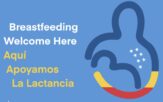The trauma of the global pandemic amidst a disturbing nationwide rise in violence and discrimination. To our families who have experienced trauma, we stand with you, and we mourn with you. We reaffirm our responsibility to fight racism and uphold our commitment to making central affinity spaces for all breastfeeding families in Durham.
Right now we at Breastfeed Durham are hearing from parents that they want providers who “get them” – who treat them with respect, honor them as a whole person, and acknowledge that past and present pain, both physical and emotional, affects their health outcomes. The number of parents, especially women, who have experienced sexual trauma is high enough that we should always assume a parent is a trauma survivor until they communicate to us otherwise, always creating spaces that they feel safe and whole.
Parents are asking…
- Can you connect me to a person who can advocate for me by providing me with a list of local providers who “get me”?
- Can you provide me with a list of local and/or national resources, so that I can be informed and/or self-advocate?
- Can more comprehensive training on trauma-informed care be provided for health care providers? (we are constantly updating our tool kit for medical providers.)
Additional lactation equity resource
Parents are not always open to talking about trauma affecting infant feeding with lactation providers. However, they may still hope that their provider is looking for signs beyond what they are expressing. Providers may recognize certain signs of challenges with breastfeeding as a result of potential trauma even if the patient is not vocalizing their trauma.
Some providers are hearing…
- “It just hurts too much!” When there are no visible signs of nipple damage, then sometimes (not always) that statement is a sign of emotional rather than physical pain.
- “I can’t do this.” Combined with an unwillingness to talk about why always leaves us with questions.
- “I’m not making enough milk.” While the baby is gaining a healthy amount of weight, but the parent seems adamant.
We at Breastfeed Durham sometimes hear providers saying… “the parent is giving up too easily” or “there is nothing wrong.” This always frustrates us because the statements above are always a sign of something being wrong (the provider just hasn’t figured out what that something is). We believe that every parent is an expert on their own body. We believe the parent is the expert on the child. We believe the parent knows the child better than anyone else, and the provider’s job is to help each parent make educated and informed decisions.
Spark Equity
Recently we had the opportunity to talk with Elizabeth Johnson of sparkequity.org about trauma and infant feeding. Trauma-informed care related to the topic of sexual abuse is essential for lactation professionals.
Some key takeaways from our conversation:
- Lactating people do not always connect the challenges they are experiencing with breastfeeding with their trauma history.
- Peer to peer support providers often forget about trauma-informed care.
- Remember to see the patient as an expert on themselves.
- Be willing to seek out training to provide trauma informed care.
- The best avenue for change is often helping parents advocate better for themselves, sometimes via their iBCLC or their doula, and sometimes on their own.
Resources and Upcoming Conferences
- Sparkequity.org
- When Survivors Give Birth: A Trauma Focused Training for Professionals Who Work with Pregnant People and New Families, December 4-6, 2020, offered virtually by SparkEquity.
- Elizabeth Johnson’s La Leche League Webinar from last fall, When Breast Isn’t Best: Challenges and Opportunities for Sexual Abuse Survivors, available online.
Birth Trauma Resources for Parents
- Website that uses FOCUSING: Can get 1-3 free sessions by doing sessions with a trainee
- Online resources and support groups
- Postpartum Support International – Support Groups
- Birth and Trauma Support Center – Website and Facebook group
- Unfold Your Wings: Hope & Support for Birth Trauma and Perinatal PTSD
- Birth Trauma Association: parent support group – Facebook group
- Solace for Mothers: Healing After Traumatic Childbirth
- PATTCh is an Organization Dedicated to the Prevention and Treatment of Traumatic Childbirth

